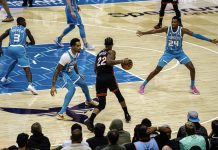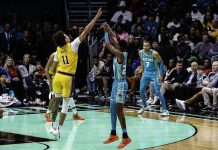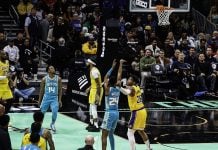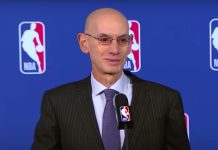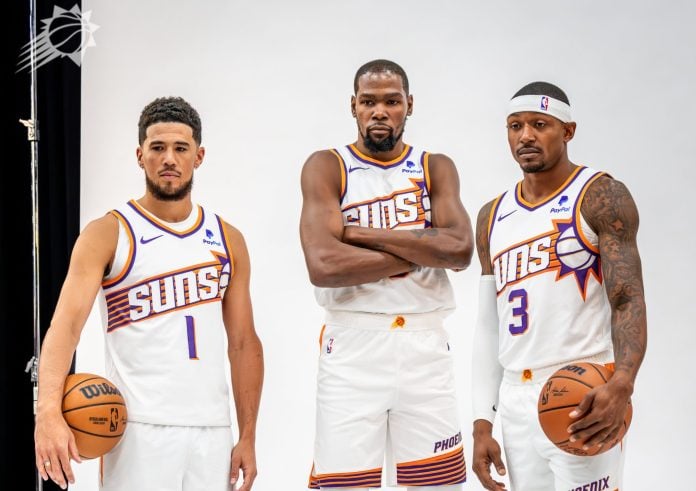
In the landscape of professional basketball, the allure of assembling a roster boasting three or more superstars, a phenomenon often dubbed a “super team,” has become a tantalizing pursuit. However, the question that looms large is whether the formation of such star-studded alliances guarantees success on the NBA’s grand stage.
The Rise and Fall of Super Teams
The trend of super teams gained traction in the early 2000s, notably exemplified by the Los Angeles Lakers. In an attempt to extend their championship window, the Lakers added veterans Karl Malone, and Gary Payton to a roster already featuring Shaquille O’Neal and Kobe Bryant. Despite the star-studded lineup, chemistry issues and injuries led to disappointment, and the Lakers fell short in the NBA Finals.
Fast forward to recent years, the Brooklyn Nets created headlines with the triumvirate of Kevin Durant, James Harden, and Kyrie Irving. The trio’s potential was cut short as they played just 16 games together before Irving’s absence and eventual disbandment. This raised doubts about the sustainability of super teams.
Los Angeles Lakers (2003-2004): Superstars: Kobe Bryant, Shaquille O’Neal, Karl Malone, Gary Payton
Outcome: Despite the formidable lineup, internal conflicts marred their campaign, leading to a Finals loss against the Detroit Pistons.
Boston Celtics (2007-2012): Superstars: Kevin Garnett, Paul Pierce, Ray Allen
Outcome: The Celtics trio swiftly found success, clinching an NBA title in their first season together and reaching the Finals again in 2010.
Miami Heat (2010-2014): Superstars: LeBron James, Dwyane Wade, Chris Bosh
Outcome: The “Big Three” secured two championships (2012, 2013) and made NBA Finals appearances in all four seasons together.
Golden State Warriors (2015-2019): Superstars: Stephen Curry, Klay Thompson, Kevin Durant
Outcome: The Warriors dominated, securing two championships (2017, 2018) and consistently reaching the NBA Finals.
Cleveland Cavaliers (2014-2018): Superstars: LeBron James, Kyrie Irving, Kevin Love
Outcome: The Cavaliers, led by their dynamic trio, achieved historic success with a comeback victory in the 2016 NBA Finals.
Brooklyn Nets (2020-2022): Superstars: Kevin Durant, James Harden, Kyrie Irving
Outcome: Hindered by injuries and limited playing time together, the trio played only 16 games before disbanding.
Championships and Superstar Duos
Contrary to the super team narrative, a significant number of NBA championships were clinched by teams boasting one or two superstars. From Kobe Bryant and Shaquille O’Neal’s dominant run with the Lakers to LeBron James partnering with Kyrie Irving and later Anthony Davis, history shows that a well-balanced duo can be just as effective, if not more so, than a trio of superstars.
The dynamic duos of Kevin Garnett and Paul Pierce, Shaquille O’Neal and Dwyane Wade, as well as Steph Curry with Klay Thompson (and later Kevin Durant), and Nikola Jokic with Jamal Murray underline the championship success achieved by teams relying on strategic pairings rather than an abundance of superstars.
The Current Landscape
In the contemporary NBA, two teams have recently formed super teams with varying degrees of success. The Phoenix Suns, adding Bradley Beal alongside Devin Booker and Chris Paul, have faced challenges due to injuries, occupying the 9th place in the Western Conference with a record of 19 wins and 17 losses.
On the other hand, the Los Angeles Clippers experienced a rough patch after acquiring James Harden but have since found their rhythm. With veteran superstars Kawhi Leonard, Paul George, and Russell Westbrook, the Clippers currently sit fourth in the Western Conference with a record of 22 wins and 13 losses.
Conclusion
The debate on the effectiveness of super teams in the NBA continues to unfold. While some falter due to unforeseen circumstances, others find success through strategic pairings and well-defined roles.
The Phoenix Suns and Los Angeles Clippers serve as contemporary examples, showcasing that the journey of a super team is filled with challenges and uncertainties, challenging the notion that assembling a plethora of superstars guarantees championship triumph.

